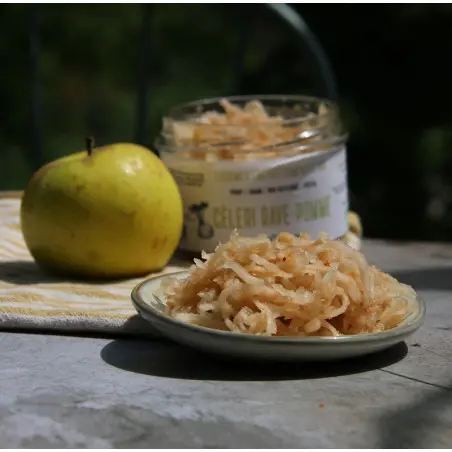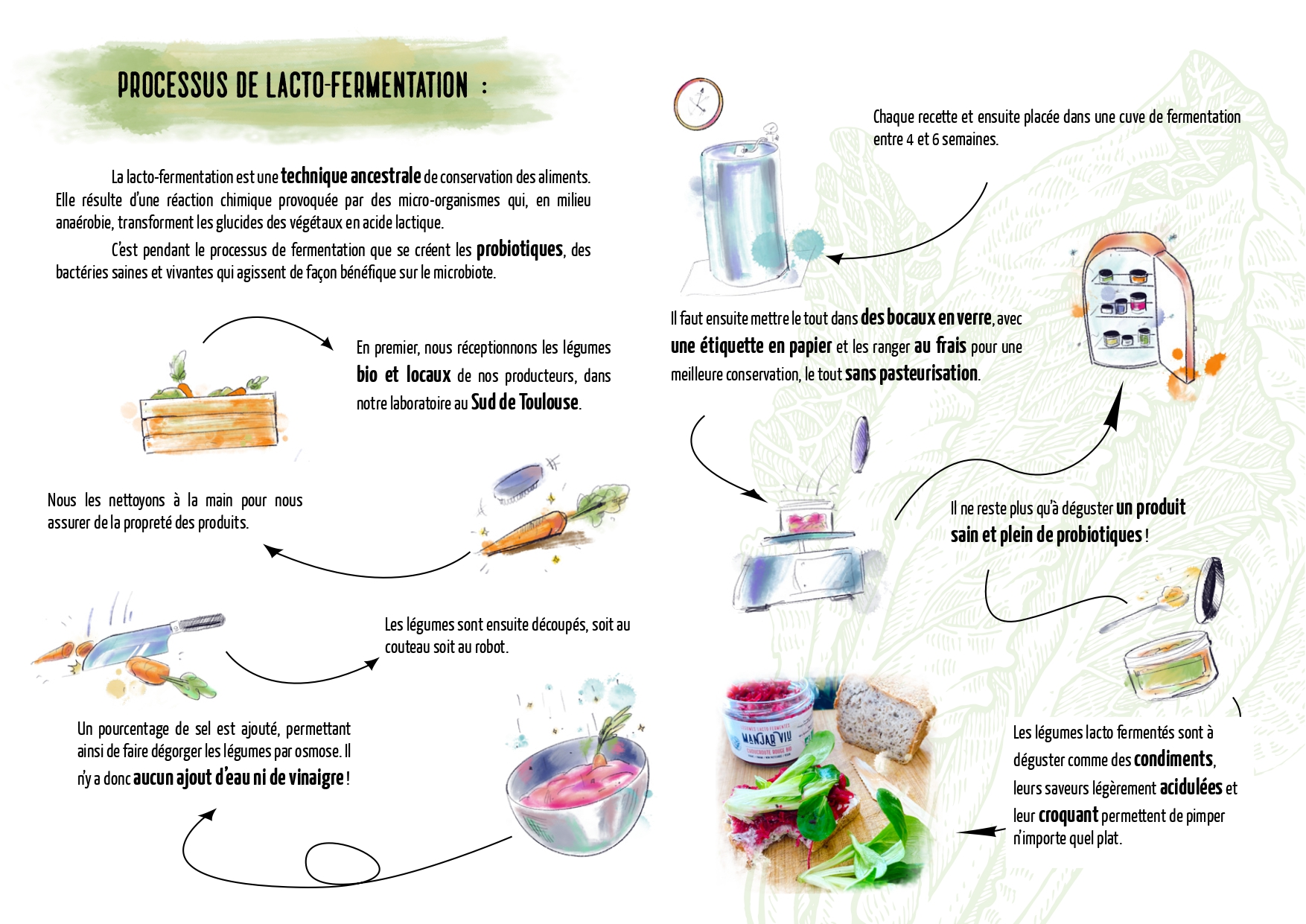- On sale!
- -€1.00
- Out-of-Stock


















Organic Lacto-Fermented Celeriac and Apple
Certified Organic
Unpasteurized
Artisanally Made in France
400 g Glass Jar
It is with great enthusiasm that we present to you the lacto-fermented, unpasteurized, and certified organic products from MANJAR VIU ("Living food" in Occitan) !
🦠 Based on celeriac and apple from organic and local agriculture, this tasty mix of lacto-fermented vegetables, has been prepared with care, in an artisanal manner, and without pasteurization. It is a unique way to combine vitality and practicality on your plate.
> Without preservatives or artificial flavors, or vinegar (which is antiseptic), you will add plenty of prebiotics and probiotics to your dishes with just one to two tablespoons of this preparation! (if it makes a "pschiit" sound when opened, that's normal, it's a living product!)
To be savored like condiments, the unique flavors of slightly tangy lacto-fermented vegetables and their crunch can indeed enhance any meal! Behind this jar of lacto-fermented vegetables, a taste adventure and an explosion of authentic flavors await you with every bite: The sweet and fruity taste of the apple pleasantly enhances everything, and the richness of the umami flavor in this recipe provides a unique sense of satisfaction !
🦠 How to consume this jar of lacto-fermented vegetables ?
Lacto-fermented vegetables can be used as a side dish on salads, or in wraps, makis, or on crackers. These condiments will instantly jazz up your dishes, salads, appetizers, toasts, sandwiches, and soups !
> It was invented about 10,000 years before the advent of refrigerators and other industrial processes. Many countries around the world have developed recipes for lacto-fermented vegetables: sauerkraut in Europe, kimchi and miso in Asia, cereals and legumes in Indonesia, etc.
> It is the result of a chemical reaction caused by certain yeasts, bacteria, or fungi that, in an anaerobic environment (without oxygen), transform the carbohydrates of plants into lactic acid. The environment gradually becomes more acidic, thus preventing the development of other organisms.
> This method has no connection with lactose. Its name comes from the bacteria involved, called lactic bacteria or lactobacilli, which do not come from milk. Lactic acid is a natural preservative that inhibits the development of pathogenic bacteria and germs that could degrade vegetables. Thus, the vegetables retain all their vitality, or even more !
Fermentation is thus an effective means of preservation and a culinary art that offers a wide range of surprising textures and flavors. It is also an ancient method of food preservation, which requires different steps and regular monitoring to ensure that the final product is of the highest quality.
> Fermentations all have in common the strengthening of the immune system, the support of the intestinal flora, and they provide valuable aid to digestion. Fermented foods are indeed highly recommended for the well-being of the digestive system. In addition to improving digestion and providing probiotics, fermentation enhances the bioavailability of nutrients.

🦠 To learn more, also check out our blog articles:
Lacto-fermentation, a true health asset !
What are the benefits of fermented foods ?
Lacto-fermentation reveals the flavors of foods and promotes the balance of the intestinal microbiota. The vegetables remain alive, are easier to digest, detoxifying... and delicious !
🦠 The main advantage of lacto-fermented vegetables is their concentration of probiotics. These beneficial bacteria enrich, regulate, and rebalance your gut flora. Thanks to them, you regain good intestinal health, and as we know, the digestive system is our second brain! Taking care of it with probiotics helps improve many functions of your body.
🦠Lactofermentation is therefore a process of multiplying nutrients through a living microcosmic activity. Bacteria, enzymes, and yeasts transform simple sugars into organic acids, proteins into amino acids, while increasing vitamins and digestibility.
Lacto-fermented foods have several health benefits:
> they are rich in active ingredients and micronutrients (particularly high in vitamins C, B12, and B3). For example, cabbage turned into sauerkraut sees its vitamin C content increase by up to 300% !
> They facilitate the assimilation of nutrients. Without the help of bacteria, many proteins, complex sugars, and vitamins would reach the end of the digestive tract in an "undigested" state, meaning that these molecules would not have been sufficiently broken down during the digestion process and would be too complex to cross the intestinal membrane and be absorbed by the body !
> They are rich in enzymes, very digestible, and promote the development of healthy bacteria in the intestines.
> They contain acids that ensure detoxification functions and play an antibiotic and preventive role against degenerative diseases.
🦠 To learn more about the benefits of lacto-fermentation, also check out our blog articles on this topic:
> What are the benefits of fermented foods ?
> Lacto-fermentation, a true health asset !
Located in Lahage, near Toulouse, within the Bordanova Third Place, Mathieu, at the helm of Manjar Viu, specializes with passion and dedication in the lacto-fermentation of vegetables. Collaborating with local organic farmers, his company ensures a fast and direct supply of vegetables, without intermediate storage. The production follows the rhythm of the seasons and accepts all shapes and sizes of vegetables to minimize food waste and transport emissions.
The products of Manjar Viu are natural, without preservatives or vinegar, allowing fermentation to continue after storage.
🦠 We had the pleasure of meeting Mathieu in October 2024, find our interview with him in this video:
🦠 Furthermore, with Mathieu having a culinary background, he became passionate about food preservation, finding lacto-fermentation ideal for its ecological and longevity benefits. With Manjar Viu, he aims to offer nutritious and delicious recipes while highlighting local cultures. He also published a recipe book in September 2022, titled "Do Yourself Good, Eat Living," to promote the daily use of lacto-fermented vegetables, an excerpt of which is as follows:
"Today, in a constantly changing world, where uncertainty is permanent, a sanitized, polluted world increasingly devoid of nutrients, my wish with this project is to offer tasty and healthy recipes to boost vitality."
Ingredients : Celery* (66%), apple* (32%), and salt
*ingredients from organic farming.

Packaging: Available in a 400g glass jar
DDM : Consume within one month after opening.
Storage method: Keep refrigerated between 4 and 8 degrees.
| Average nutritional values | 100 g |
Energy | 42.4 Kcal |
| Carbohydrates (of which sugars: | 8.1 g 3.5 g |
| Fibers | 4.5 g |
| Proteins | 0.9 g |
| Salt | 2 g |
Ces produits pourraient vous intéresser